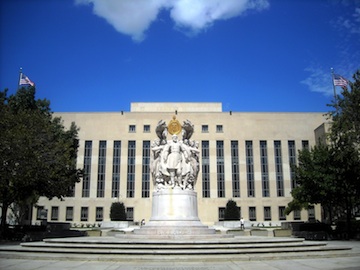Court Hears Challenge to FCC's 5G Radiofrequency Guidelines
Panel of D.C. circuit weighs in on longstanding issue

The smarter way to stay on top of broadcasting and cable industry. Sign up below
You are now subscribed
Your newsletter sign-up was successful
The U.S. Court of Appeals for the D.C. Circuit heard oral argument Monday (Jan. 25) in the case of groups trying to force the FCC to rethink its radio-frequency exposure guidelines for, among other things, Wi-Fi, 5G, cell phones, cell towers and more.
Hearing the case were Judges Karen Henderson, Patricia Millett and Robert Wilkins.
The judges appeared concerned that the FCC was relying what appeared to be cursory sign-off by the Food And Drug Administration, pointing out that the record did not cite any input from an FDA committee or FCC working group charged by Congress with reviewing RF standards, and asked the FCC find out by close of business Tuesday whether those committees existed and had reviewed the standards.
Judge Wilkins went so far as to assert that he was inclined to rule against the FCC because there had been no reference to either committee and the FCC had essentially said "not to worry" because it was willing to change if its RR working group found reason to, a group that the record did not indicate had weighed in on the current guidelines, which the FCC in 2019 concluded did not need to be changed.
The judges were concerned that while the FCC had sought input on the standards given the rise in the ubiquity of mobile device use, particularly in the pandemic. And that while the FCC had sought input on those changes--which include and tablets and watches and iPhones, and not in purses or holsters but constantly in the hands of everyone, including children--but that the FDA had only talked about cell phones in saying it saw no reason to change the standards.
The FCC is required by law to periodically evaluate the impact of RF devices--these days most prominently smart phones--on quality of the "human environment."
Also Read: FCC to Berkeley: Stay Out of Our RF Lane
The groups challenging the FCC guidelines--Environmental Health Trust (EHT), Children's Health Defense (CHD) et al--argue the commission ignored evidence showing that its guidelines allow levels of radiation harmful to "humans, wildlife and the environment."
Also Read: Hill Hot Over Tower Workers' RF Exposure
They also said the FCC's record in coming up with its guidelines did not show that they were the product of reasoned decision making and thus they are arbitrary and capricious in violation of the Administrative Procedure Act. In addition, they said the FCC failed to gauge the environmental impact or consider the impact on public safety.
Also Read: FCC Document Supports Apple in RF Suit
“This is a landmark case and it is of the utmost importance to the Children’s Health Defense which works relentlessly to eliminate the epidemic of sickness in children,” said that group's chairman, Robert F. Kennedy Jr. “The American public has been poorly served by the FCC. The FCC’s guidelines are decades-old and are based on scientific assumptions that were proven false. Its failure and disregard of public health is evident in the growing and widespread conditions involving brain damage, learning disabilities, and a host of complex neurological syndromes.”
In 2019, decided not to change its RF emission exposure limits or how it evaluates those limits for mobile device use, resolving a 2013 order and notice of inquiry into the issue.
Saying it took to heart the FDA's findings that "t]he weight of scientific evidence has not linked cell phones with any health problems," the commission voted unanimously--with commissioner Jessica Rosenworcel concurring, which is short of a full-throated "aye," to retain the current limits, but to adjust the rules" to ensure the health and safety of workers and consumers of wireless technology, while also clarifying and streamlining rules to reduce regulatory burdens on licensees."
The FCC argues that at the power limits opponents of its standards want to impose--a million times less powerful, for example--the relevant communications systems, like 5G and Wi-Fi--won't work.
In the oral argument, the FCC said that it had reasonably relied on the FDA's input after engaging in that the FDA called its ongoing review, but also on other agencies and experts in concluding it could close its notice of inquiry and maintain the 1996 standards.
The smarter way to stay on top of broadcasting and cable industry. Sign up below
Contributing editor John Eggerton has been an editor and/or writer on media regulation, legislation and policy for over four decades, including covering the FCC, FTC, Congress, the major media trade associations, and the federal courts. In addition to Multichannel News and Broadcasting + Cable, his work has appeared in Radio World, TV Technology, TV Fax, This Week in Consumer Electronics, Variety and the Encyclopedia Britannica.

